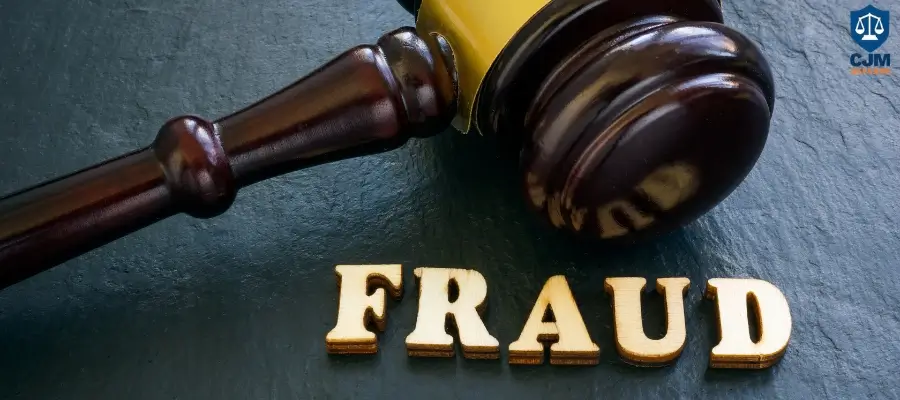Santa Ana Fraud Defense Lawyer

Santa Ana Fraud Defense Attorney
Fraud – is an act taken for the purpose of deceiving someone into surrendering something of value. Fraud is a criminal act, but may also be a civil violation. Most often, fraud is perpetrated for the purpose of extracting money from the victim. However, other items of value may be given instead, and it is still fraud to acquire these through deception or trickery.
Bankruptcy fraud – is also an act of fraud, however in that case the fraud is committed against some or all of the perpetrator’s creditors through false statements made in a bankruptcy filing. This is also a criminal act which carries penalties prescribed by federal law.
There are nine elements to a fraudulent act under common law. These elements are:
- That the accused made a statement that some fact exists;
- That the representation is relied upon by the person who was victimized by the fraud;
- That the statement is false;
- That the person making the statement, later the accused, knew the statement was false;
- That the intent of the person making the statement was that it would be relied upon by the victim;
- That the victim did not know that the statement was false;
- That the victim did in fact rely upon the truthfulness of the statement;
- That the victim had a right to rely upon the statement; and
- That the victim suffered a loss or was otherwise damaged by his or her reliance on the statement.
Statutory law in any jurisdiction may vary, but most laws concerning fraud consist of these same elements.
The standard of evidence for the prosecutor in a fraud case is that each element be proven to a clear and convincing level. This means that evidence against the accused must constitute very probable evidence of guilt. This is different from most criminal prosecutions, in that normally the facts of a criminal act must be proven beyond a reasonable doubt. Thus, for a prosecutor to prove fraud, he or she will be allowed to satisfy a lower standard of proof.
Fraud is commonplace in the United States and many other parts of the world. Teams of law enforcement agents from local jurisdictions and the Federal Bureau of investigation (FBI) specialize in detecting and prosecuting fraud.
The FBI maintains a sort of Who’s Who of Fraud in the United States. Notable convicts are included on that list. These include Frank Abignale, Jr., who was the object of the movie “Catch Me if You Can,” Kenneth Lay, who single-handedly orchestrated the collapse of the Enron Corporation, and Charles Ponzi, developer of the Ponzi Scheme.
Fraud is committed through personal contact, and through mail, wire, telephone, and the Internet. Internet fraud has quickly become a leading form of fraud over the last few years. The Internet has an International reach, and it is easy for users to maintain anonymity. There are also software and techniques that make it possible to divert browsers to dishonest sites where credit card details can be acquired. It is also difficult to confirm or contravene legitimacy of claims made online.
Other common types of fraud in Santa Ana include confidence games, check fraud, credit card fraud, counterfeiting, false advertising, false billing, insurance fraud, embezzlement, securities fraud, welfare fraud, and others. Some types of fraud are simple in their implementation and are carried out by only one perpetrator, and others are quite complex, requiring multiple participants. Confidence games, for instance, are normally carried out by just one offender, who gains the confidence of a person or several people in order to complete the fraud. The perpetrator of a confidence game may be known as a con man or con artist. One of the most well known confidence men of recent times is Bernard Madoff, at one time chairman of the NASDAQ stock exchange, who then admitted to perpetrating a massive, multi-billion dollar Ponzi scheme. Complex frauds include securities fraud, which is generally a highly intricate scheme requiring the cooperative effort of a number of participants. Securities fraud is sometimes also known as white collar crime.
CALL 888-360-4256 To Speak With Lawyer Christopher McCann
Criminal penalties for fraud range from fines and probation to prison sentences of several years. Penalties will depend upon the nature of the crime, including whether or not any individual person or persons were victimized, and the size of the crime in value of improperly acquired property. Santa Ana Fraud Defense Lawyer specialize in cases of fraud to defend suspects during prosecution. Anyone in Southern California who is suspected or accused of fraud will want to consult a criminal defense lawyer. It is recommended that anyone suspected of such a crime seek counsel as soon as a suspicion of fraud arises. Santa Ana Fraud Defense Attorneys have extensive experience with various types of fraud and will try to distinguish between innocent error and intentional deceit. Criminal defense attorney Christopher McCann focuses in the area of fraud, and he offers a free consultation to anyone who may become subject to prosecution. Christopher McCann is a criminal defense attorney practicing in Irvine, California.
Law Offices Of Christopher J. McCann, APC – Santa Ana, CA Office
1633 E 4th St Ste 248,
Santa Ana, CA, 92701
Contact: 949-596-0060
Schedule Your
Free Consultation
Fields Marked With An “*” Are Required
© Copyright 2025 Law Offices Of Christopher J. McCann, APC. All rights reserved.


